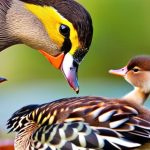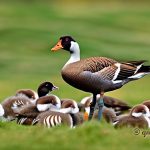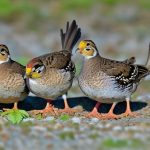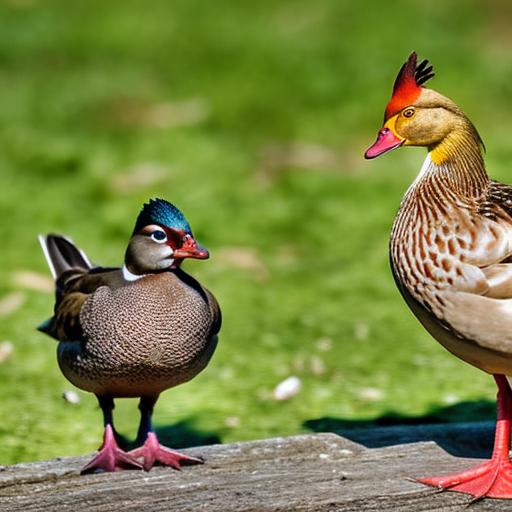Hello to all my fellow geese enthusiasts! Ever caught yourself in the feed store, holding a bag of chicken feed and pondering whether it’s alright to let your gaggle of geese partake? You’re certainly not navigating these waters alone.
Figuring out just what to toss into the feeding mix for our winged companions can be as tricky as a wild goose chase. Is that blend created for chickens going to fit the bill for your cackling crew, or might it cause some flapping feathers?.
I totally understand that kind of situation – there I was once, lingering in front of shelves stacked with sacks of grains, with questions swirling around like leaves in a pond. But fear not; after immersing myself in avian dietary needs and picking the brains of bird nutritionists, I’ve managed to separate the wheat from the chaff when it comes to guidelines we can trust.
Here’s what I found: indeed, our elegant geese can quite happily peck away at chicken feed as part of their varied grub lineup! That tidbit should help smooth any ruffled feathers.
In this blog post, we’ll gracefully glide through everything from nutritional benefits to potential snags you might hit upon adding a dash of chicken cuisine into your goose’s buffet line-up.
We will also shine a spotlight on primo alternatives crafted specifically for those paddling beauties. So if you’re ready for some fine feathered insights – let’s flap ahead into this culinary journey together!
Nutritional Benefits of Chicken Feed for Geese
Chicken feed is high in protein and essential nutrients, promoting healthy growth and feather development for geese.
High in protein and essential nutrients
Chicken feed packs a powerful punch of protein, which is key for my geese’s growth. The essential nutrients in the feed support their overall health. Protein helps build strong muscles and promotes quick healing.
Vitamins and minerals found in poultry feed keep feathers glossy and bones sturdy.
Feeding my geese chicken feed also ensures they get all the goodness they need each day. Since geese are big birds, this hearty food aids in their daily energy demands. It boosts their immune system too, making them less likely to get sick.
While I make sure grass is part of their diet, chicken feed fills any gaps for a complete meal plan for my feathered friends. They thrive on it as much as on waterfowl or gamebird feeds designed just for them.
This mix meets the specific nutritional requirements geese have for happy lives on the farm.
Promotes healthy growth and feather development
Chicken feed is crucial for promoting healthy growth and feather development in geese. It provides essential nutrients and high protein levels, supporting their overall well-being.
A balanced diet of chicken feed can ensure that geese have strong, healthy feathers and experience optimal growth. This contributes to the vitality and resilience of the geese, enhancing their ability to thrive in various environments while maintaining vibrant feather quality.
Additionally, incorporating chicken feed into a goose’s diet from a young age plays a significant role in fostering robust feather development by providing the necessary nutrients during their critical growth stages.
This helps them grow into strong and resilient birds with healthy plumage, ensuring they are better equipped to withstand environmental factors and maintain excellent physical condition throughout their lives.
How to Incorporate Chicken Feed into a Goose’s Diet
To incorporate chicken feed into a goose’s diet, you can mix it with water or other grains to make it easier for them to eat. You can also supplement their diet with cracked grains for extra energy and nutrients.
Mixing with water or other grains
Geese can benefit from chicken feed mixed with water or other grains. This helps ensure they receive the necessary nutrients and protein in their diet for healthy growth and feather development.
Supplementing their diet with cracked grains can also provide them with extra energy, supporting their overall well-being. It’s important to consider these options when incorporating chicken feed into a goose’s diet to maintain their nutritional requirements.
As omnivores, geese consume a variety of food sources, making it essential to mix chicken feed with water or other grains in order to enhance their intake of essential nutrients and promote healthy growth and development.
Supplementing with cracked grains for extra energy
Supplementing cracked grains is essential for providing geese with extra energy. Geese enjoy the variety and added texture of cracked grains in their diet. Cracked corn, wheat, or barley can be mixed into their feed to boost their energy levels.
These grains are rich in carbohydrates, which help meet the high-energy demands of geese, especially during colder months or when they are molting. Providing cracked grains as a supplement ensures that geese have the necessary fuel for maintaining their activity levels and overall health.
When incorporating cracked grains into a goose’s diet, it’s important to ensure a balanced intake of nutrients from various sources. Adding these grains should not replace other essential components of their diet such as complete feed and fresh greens.
By offering this supplemental energy source, we help cater to the specific dietary needs of our geese.
Potential Issues with Long-Term Feeding of Chicken Feed
Prolonged feeding of chicken feed to geese may lead to a lack of necessary niacin and potential nutrient deficiencies. It is important for geese keepers to be aware of these issues and consider alternative feeding options or supplements.
Lack of necessary niacin
Geese need to be mindful of their niacin intake as chicken feed might lack this essential nutrient. Niacin is crucial for the proper development and functioning of a goose’s nervous system, so it’s important to ensure they receive enough in their diet.
Without sufficient niacin, geese can develop health issues like leg problems or swollen joints. To address this, supplementing with niacin-rich feeds such as waterfowl or gamebird feed can help maintain the necessary balance in their diet.
Moving ahead to discussing Potential Issues with Long-Term Feeding of Chicken Feed..
Risk of nutrient deficiencies
Lack of necessary niacin can lead to nutrient deficiencies, affecting the overall health of geese. This is a crucial aspect to consider when deciding on the diet for your flock. Geese require a well-balanced diet that includes essential nutrients to prevent deficiencies and maintain their well-being.
It’s important to be vigilant about providing them with all the necessary nutrients, ensuring they stay healthy and vibrant. Regularly evaluating their diet will help in identifying and addressing any shortcomings, thereby promoting optimal health and development.
Geese keepers must prioritize preventing nutrient deficiencies by carefully selecting feeds rich in essential nutrients and regularly monitoring their flock’s overall health. Maintaining balanced nutrition is vital for supporting the vitality of geese, keeping them strong, active, and thriving.
Alternatives to Chicken Feed for Geese
If you’re looking for alternatives to chicken feed for your geese, consider waterfowl or gamebird feed as a suitable option. Additionally, incorporating fresh greens and forage into their diet can provide the necessary nutrients and variety they need for optimal health.
Waterfowl or gamebird feed
Geese keepers can consider waterfowl or gamebird feed as a beneficial alternative for their geese’s diet. This type of feed is specifically formulated to cater to the nutritional needs of waterfowl and gamebirds, making it an ideal choice for geese.
It provides essential nutrients and minerals necessary for the optimal health and development of geese, ensuring they receive a well-rounded diet that supports their specific dietary requirements.
Incorporating waterfowl or gamebird feed into your geese’s diet can help ensure they have access to a balanced and complete source of nutrition. This specialized feed contains the right balance of proteins, vitamins, and minerals needed for the overall well-being of geese.
Incorporating fresh greens and forage
As a geese keeper, consider incorporating fresh greens into your geese’s diet. These can include grass, weeds, and leafy vegetables to provide essential nutrients and diversify their food.
Fresh forage not only adds variety but also supports digestive health and overall well-being.
Additionally, offering access to natural foraging areas can stimulate your geese’s natural behavior while providing opportunities for exercise. Including a range of plant material in their diet ensures they receive the necessary vitamins and minerals vital for their growth and development as herbivorous creatures.
Conclusion
In conclusion, geese can safely consume chicken feed for essential nutrition. The high protein and nutrient content in chicken feed support healthy growth and feather development in geese.
Incorporating chicken feed into a goose’s diet is practical and efficient, promoting their overall well-being. Providing geese with a balanced diet including fresh greens and waterfowl feeds is crucial for their health.
Explore further resources on waterfowl nutrition to ensure optimal care for your geese.
FAQs
1. Can geese eat chicken feed?
Yes, geese can eat chicken feed, but it might not meet all their nutritional needs since they are natural foragers and have different dietary requirements.
2. What should we feed ducks and geese instead of chicken feed?
Ducks and geese thrive on a diet that includes grains, greens, insects, and specially formulated waterfowl feed to ensure they get proper nutrition.
3. Is homemade food a good option for feeding waterfowl?
Homemade waterfowl feed can be good if it includes the right balance of nutrients that wild or domestic fowl need for their health.
4. Why shouldn’t we give bread to geese?
Bread lacks the essential nutrients that geese require; therefore, it’s not suitable as a regular part of their diet.
5. What do wild geese naturally eat?
In the wild, geese are herbivores who mainly munch on grasses, seeds, berries and sometimes small insects or fish to fulfill their natural dietary habits.
Meet Walter, the feathered-friend fanatic of Florida! Nestled in the sunshine state, Walter struts through life with his feathered companions, clucking his way to happiness. With a coop that’s fancier than a five-star hotel, he’s the Don Juan of the chicken world. When he’s not teaching his hens to do the cha-cha, you’ll find him in a heated debate with his prized rooster, Sir Clucks-a-Lot. Walter’s poultry passion is no yolk; he’s the sunny-side-up guy you never knew you needed in your flock of friends!






